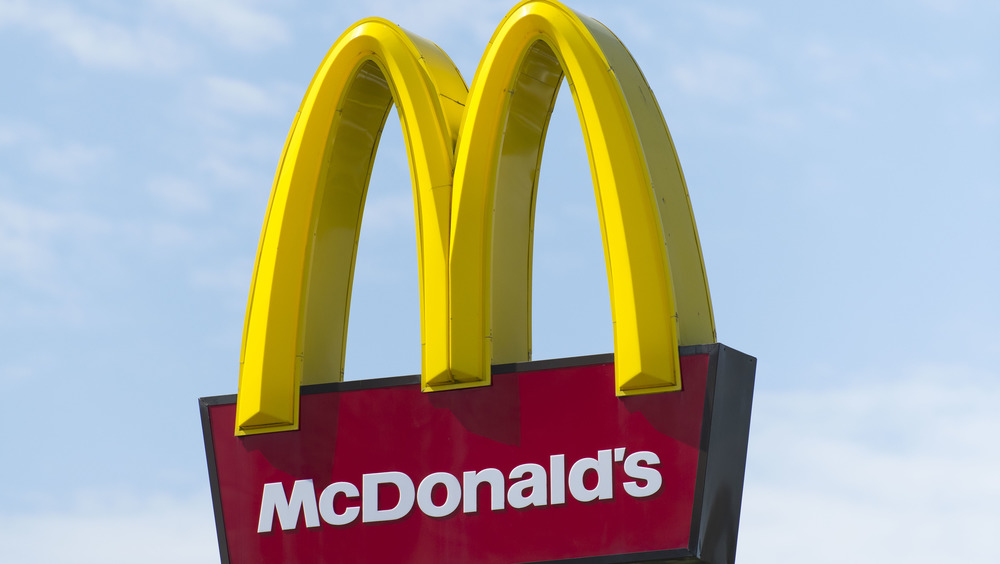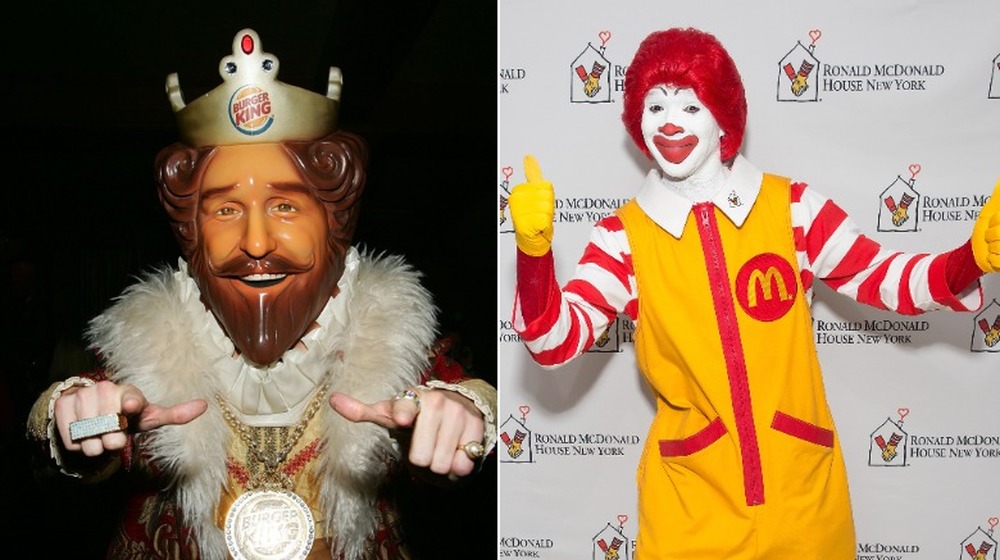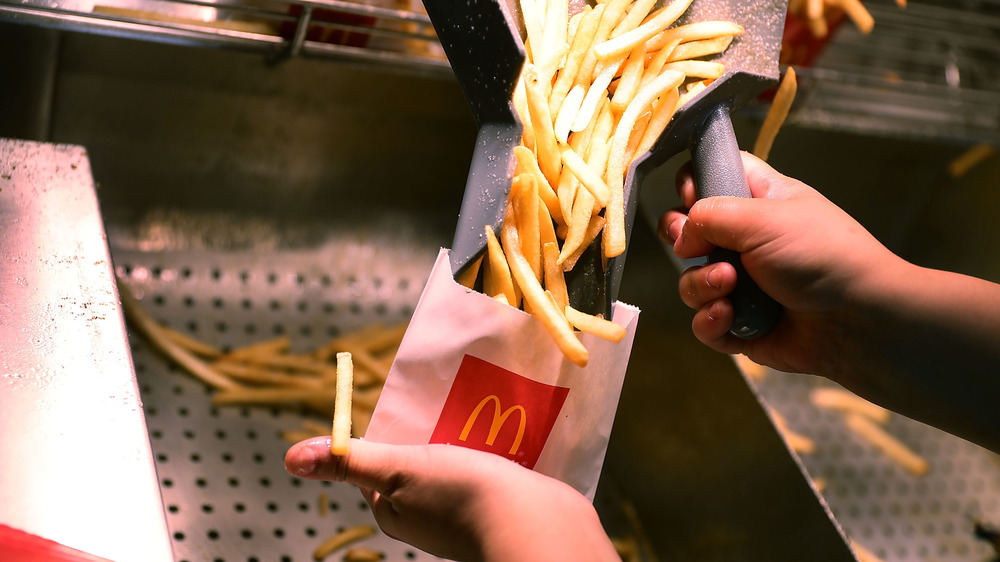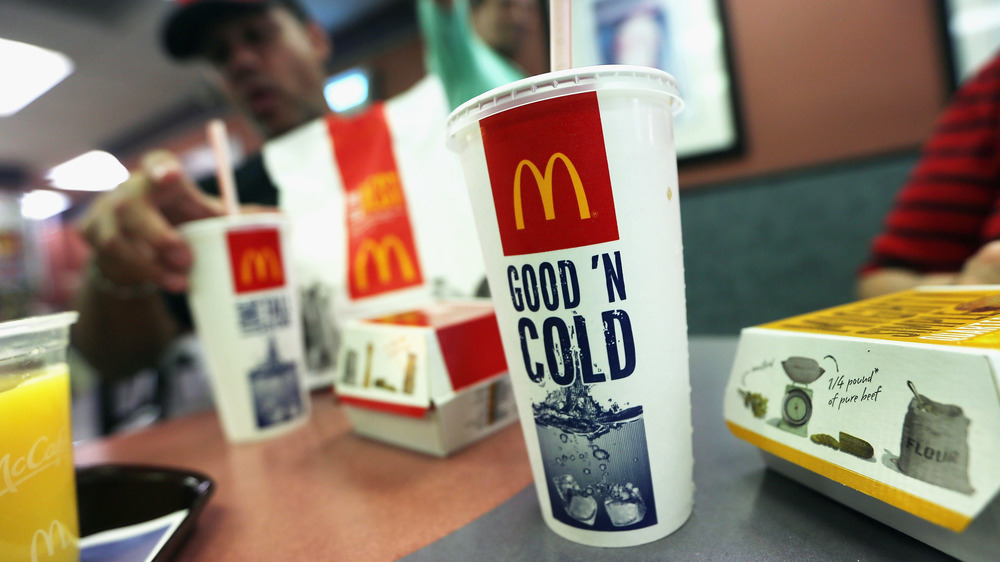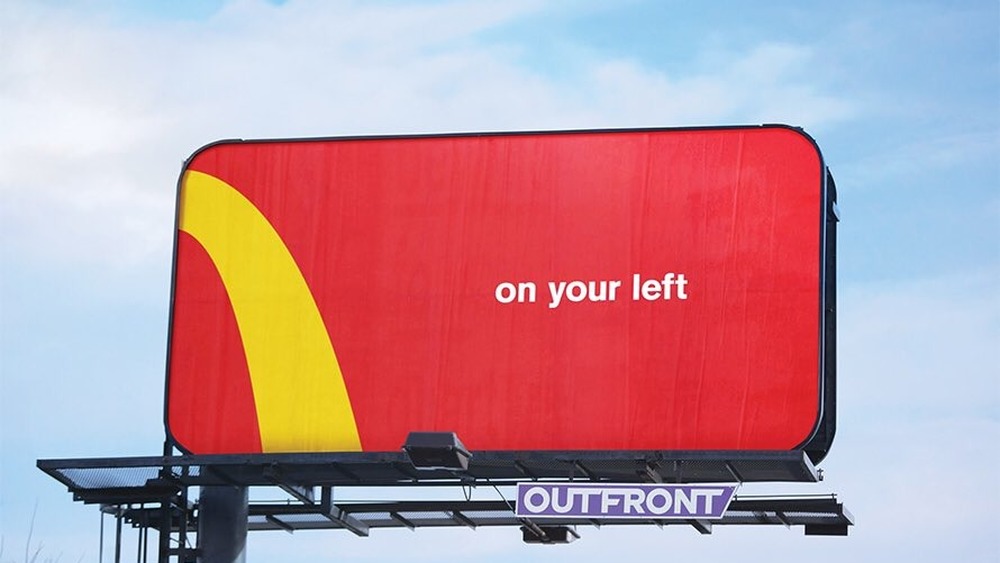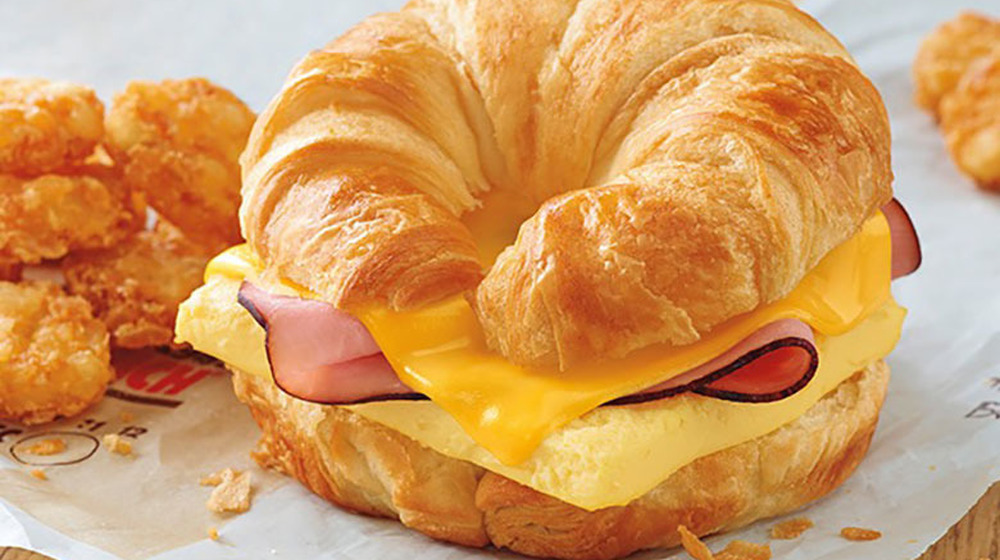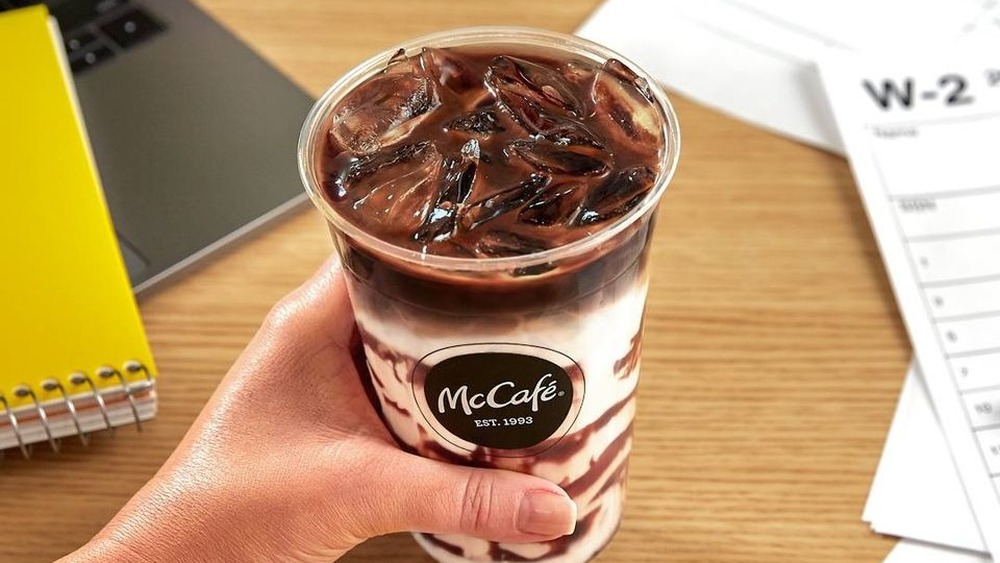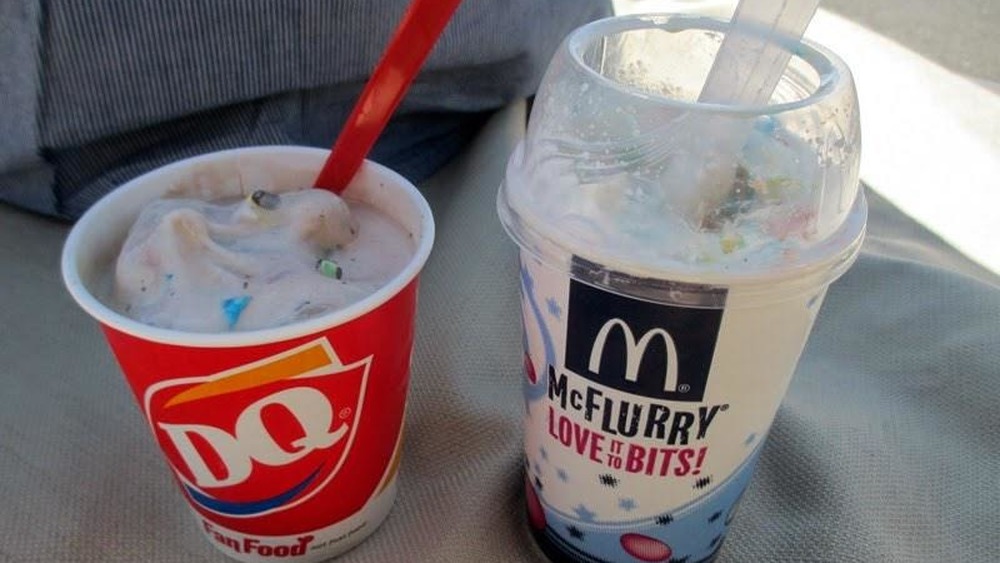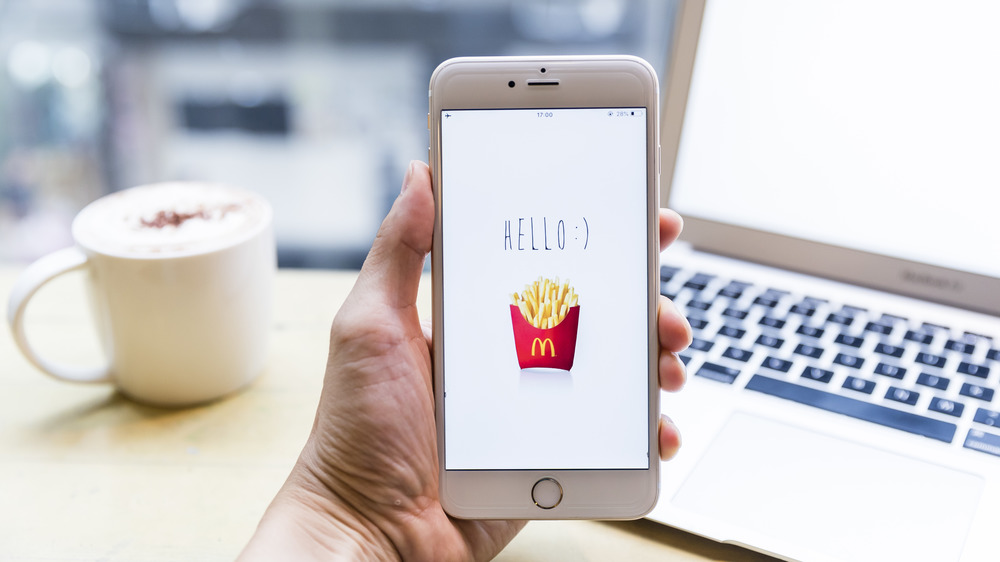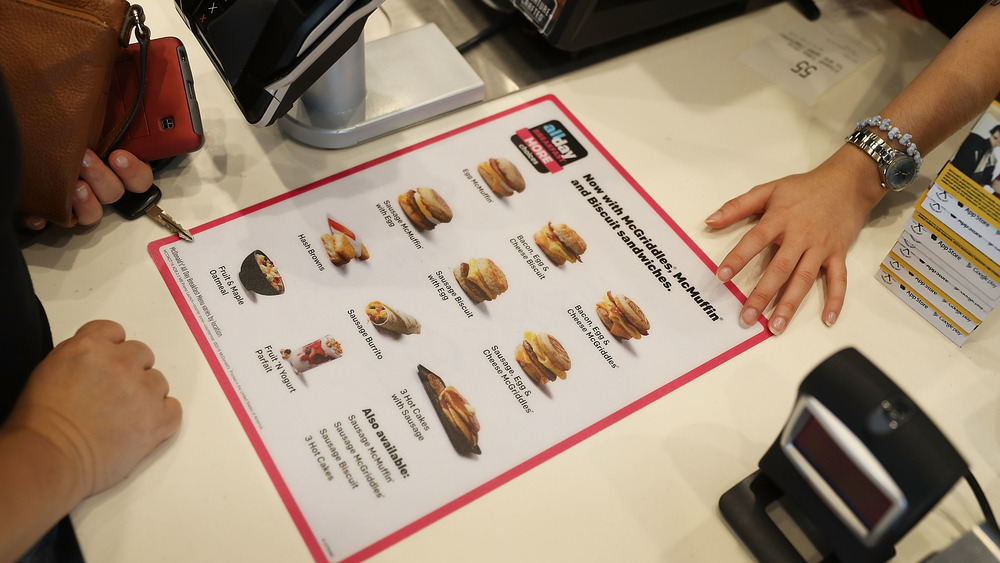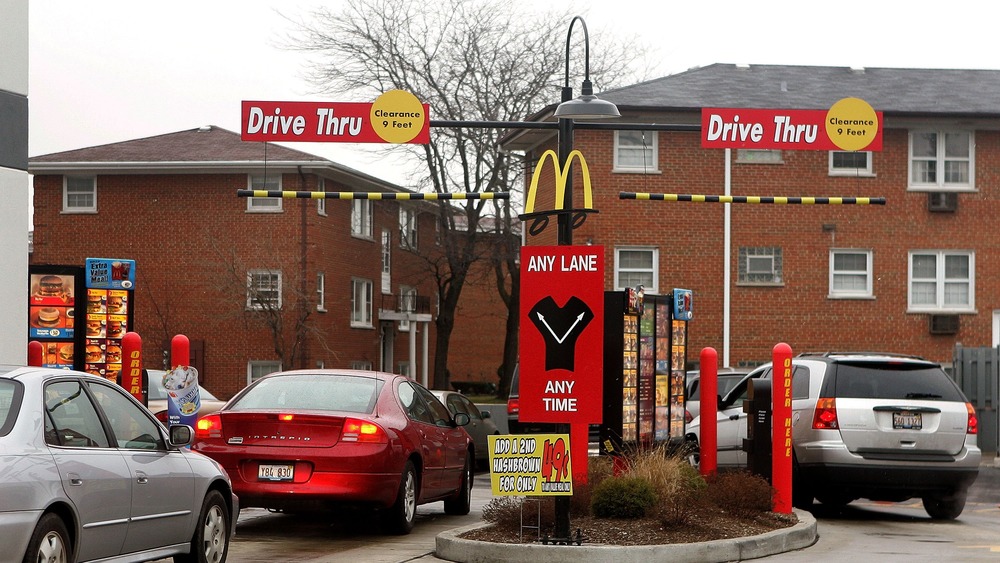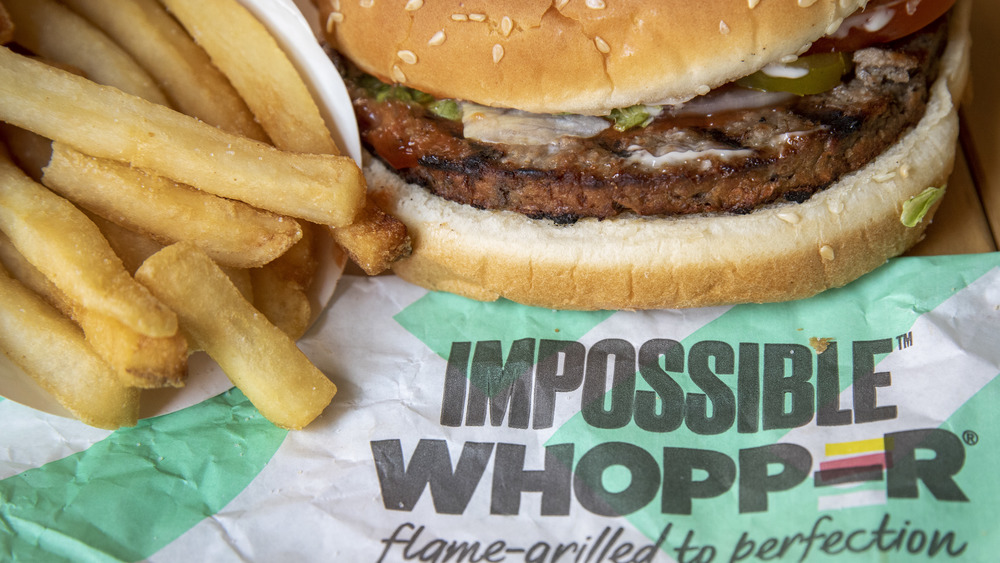Reasons Why Burger King Will Never Beat McDonald's
There's no shortage of fast food options out there for burger fans to choose from. Two of the biggest names in the industry have been around for decades and spent much of that time trying to overthrow the other. Burger King and McDonald's both started in the mid-20th century, but McDonald's made a name for itself first. Burger King's mostly been trying to catch up and surpass the burger giant ever since.
Competition between the two really ramped up in the 1970s, when Burger King kicked off the "burger wars" by publicly declaring that McDonald's had smaller burgers. The attack ads did give Burger King an edge for a brief time, but by the 1980s, they were back to playing catch up — where they've largely remained. This failure to surpass McDonald's definitely isn't for a lack of trying, though.
McDonald's and Burger King both have restaurants across the globe. They both have millions of loyal customers. They both even regularly launch marketing campaigns that make national headlines, for better or worse. At the end of the day, though, McDonald's just has more money. A lot more. According to Inc., McDonald's is valued at $130.4 billion and Burger King is only valued at $7.1 billion. (How are they supposed to compete with that?!) Money may be the overall factor, but there are certainly less obvious reasons why Burger King will never beat McDonald's.
Ronald McDonald isn't as creepy as Burger King's King
It's no secret that a lot of people consider clowns to be pretty scary. Coulrophobia — the unofficial term for fear of clowns — doesn't do Ronald McDonald any favors, but the red-headed mascot has still managed to skirt being the creepiest mascot in fast food. That title clearly goes to Burger King's dead-eyed, plastic headed Burger King.
Before McDonald's retired Ronald McDonald, the clown was a pillar of the fast food giant's marketing to kids. He was on birthday cakes, on playgrounds, and was a regular toy in Happy Meals. The King, on the other hand, was in commercials that featured him sneaking into bedrooms and scaring the bejeezus out of people. Say what you want about Ronald McDonald, but at least he spoke ... you know ... like a human. The King was largely silent for much of his run.
Nearly every time the King has retired and returned, the word "creepy" has been associated with him, as when the Miami New Times said the returning King was "as creepy as ever". Whereas, when McDonald's phased out their bozo, Ronald was labeled more of a "victim" of the tarnished reputation of clowns (via NBC News). Both mascots had their shortcomings, but it was always pretty obvious why the King wasn't invited to very many birthday parties.
McDonald's fries are way better than Burger King's
The fries from McDonald's are hands-down better than Burger King's. Unless Burger King's food scientists stumble upon some French fry miracle, BK fries will always be inferior.
This isn't to say that Burger King's fries are terrible, as they're certainly better than some other sad sacks of potatoes in fast food. McDonald's just knows how to make a good fry better than almost everyone else. There are a few things that play into this equation. One reason that McDonald's fries are so delicious is the natural beef flavoring they use, which creates flavor-enhancing MSG as soon as the potatoes hit the hot oil. The fries are also perfectly cut to achieve a balanced fry that is crispy on the outside but retains a baked potato-like fluffiness inside.
Burger King has tried time and again to develop a fry that would give them a leg up on McDonald's, and so far they've been unsuccessful. McDonald's purchases more potatoes than anybody else in the world, Inc. reports, ordering around 3.4 billion pounds annually. That's a lot of potatoes, but when a company is selling nine million pounds of fries a day, they need a lot of spuds to keep up with demand.
McDonald's also has better tasting Coke than Burger King
Neither McDonald's nor Burger King are foolish enough to carry Pepsi products, meaning that both fast food restaurants are loyal clients of the Coca-Cola empire. So how could one possibly have a better Coke to serve its customers than the other? Well, just like the French fries, McDonald's has a leg up on Burger King when it comes to soft drinks.
McDonald's doesn't have a special version of the Coke made specifically for them, however. They've just got a better system for delivering the soft drink to your mouth, right down to the straw itself. According to The New York Times, most fast food eateries receive their soda syrup delivered in bags. McDonald's has opted to stand out from the pack, however, and insists on receiving its product in steel tanks to ensure optimum soda freshness. Both the syrup and the filtered water it's mixed with are also pre-chilled to nearly freezing temperatures before hitting the soda fountain. This means your McDonald's Coke is perfectly cold from the start. Even the plastic straws Mickey D's uses — or at least used to use — are a bit wider. According to McDonald's, the reason for this is "so all that Coke taste can hit all your tastebuds."
Perhaps you think that declaring a Coke from one restaurant superior over the other is a bit trivial. Fair enough. But go out and conduct your own taste test and get back to us with the results. We'll be waiting.
McDonald's is better at marketing than Burger King
Both McDonald's and Burger King have made some pretty bad marketing decisions over the years. McDonald's just seems to make fewer of them, or perhaps the marketing mistakes they do make just don't seem as bad as Burger King's. Either way, they've been kicking Burger King's butt at marketing for decades.
To start, McDonald's logo doesn't even need the name to connect with fans. Like the Nike Swoosh, the Golden Arches are recognizable everywhere. Burger King's logo isn't bad, but the brand's name is still an essential piece of it. As U.K. marketing recruitment firm Orchard pointed out, McDonald's can get by with only putting half of the Golden Arches on a billboard and customers will still recognize the brand. Let's see Burger King get away with that.
McDonald's has also proven numerous times over the years that it's capable of drawing in its target audience of kids, families, and young people like nobody else. For example, the iconic Happy Meal was earning McDonald's around $10 million a day in 2016, according to Nation's Restaurant News. Burger King does have a kid's meal, but it's very definitely not a Happy Meal.
For a more recent example, let's look at McDonald's 2020 meal collaboration with rapper Travis Scott. The success provided a sales boost for McDonald's and helped the brand's continued appeal to the younger generation. And Burger King ... well, they tried marketing a moldy Whopper in 2020.
Burger King's breakfast innovation is a yawn
Prior to the 2020 COVID-19 pandemic that halted the morning commute for many people and caused fast food sales to plummet, breakfast was a hugely profitable segment for fast food. Keeping an edge in the breakfast wars means innovation, and it's an area that Burger King has been trailing McDonald's in for years.
The old saying, "the early bird gets the worm" couldn't be more true when it comes to breakfast competition between the two fast food giants. The birth of McDonald's breakfast started in 1970 and Micky D's came out swinging big time in 1971 with the iconic Egg McMuffin. Burger King foolishly waited until 1983 before they finally debuted a national breakfast menu. And the Egg McMuffin is hardly the only unique breakfast item McDonald's has put up over the years. The launch of the syrup-infused pancake hybrid McGriddle was a massive success that, according to The Wall Street Journal, accounted for 40 percent of the brand's same-store sales growth upon its release.
While Burger King's Croissan'wich is a worthy opponent to the Egg McMuffin, that's where Burger King's breakfast prowess ends. The brand has tried rolling out items like the Maple Waffle Sandwich and French Toast Sandwich, and while tasty, they're more McGriddle knockoffs than real breakfast innovation.
McDonald's invested in the coffee market before Burger King
According to Mintel, 66 percent of millennials drink cold coffee products, and fast food brands have taken notice. With the coffee market booming, both McDonald's and Burger King are using the appeal of coffee products to lure customers in, hoping that they'll buy some fries and maybe a burger to go with their latte. "The competition between Starbucks and McDonald's and Burger King will continue to intensify," Tyler Higgins, of AArete, a global consultancy, told MarketWatch.
Perhaps Burger King could have had a shot at competing with Starbucks and Dunkin if they'd jumped on the coffee bandwagon before McDonald's, but they didn't. McDonald's launched its McCafé back in 2009, QSR reports, and it's been incredibly successful, building up a base of customers who visit solely for their daily caffeine fix.
Burger King didn't get serious about trying to compete in the coffee market and start offering premium coffee drinks until ten years after McDonald's! Furthermore, the idea of the brand's $5 a month coffee subscription might be appealing — if Burger King's coffee was good. Burger King coffee might be better than no coffee if you're in desperate need of a jolt, but if you want a good cup of joe, you should never drink Burger King coffee.
McDonald's is better at copying success than Burger King
McDonald's is certainly an innovator in the fast food industry and a company that many of its competitors no doubt keep tabs on. This doesn't mean that McDonald's is all original ideas, though. In fact, that's hardly the case. If McDonald's sees that another brand, big or small, is doing something that works, it's a safe bet they're going to explore the idea of adapting it for their own brand.
For example, Dairy Queen began serving its iconic Blizzard desserts in 1985 and the frozen treats have been widely successful ever since. While McDonald's would likely never admit to copying this idea with their McFlurry in 1995, it's pretty easy to see the similarity between the two. Even the name is a reference to snow. McDonald's has also taken notice of just how popular Chick-fil-A has become, and the burger brand has tried creating chicken sandwiches that more closely resemble those at Chick-fil-A.
Burger King, on the other hand, seems to struggle a bit more with its copycat attempts. The burger brand tried creating their own version of the Big Mac with Big XL, but the sandwich hasn't yet proven itself worthy of becoming more than a limited-time item. Other attempts, such as trying to capture some of Taco Bell's success with the Whopperito, just came off as bad ideas that nobody ever wanted.
McDonald's has a larger social media audience than Burger King
The brand that can get its adverts in front of the most eyeballs often wins the marketing battle, and McDonald's has a lot of eyes watching. As of January 2021, McDonald's has 3.7 million followers on Twitter, 3.9 million on Instagram, and an impressive 80.7 million followers on Facebook. That's a lot of folks seeing every "ba da ba ba ba" video, meme, or photo the Golden Arches is putting out. Even if only around 5 percent of the brand's Facebook followers see whatever advert they posted that day, that's still over 4 million people.
Those numbers are hard to compete with, and by comparison, Burger King falls short. The brand has a respectable 1.8 million followers on Twitter and 1.9 million on Instagram, but where McDonald's really crushes them is on Facebook. Poor Burger King only has about 10 percent of McDonald's Facebook audience with 8.4 million followers. Even the most brilliant, perhaps "sadistic" of Facebook ad campaigns won't be enough to help Burger King catch up to McDonald's at this point.
Burger King didn't stand a chance against McDonald's all-day breakfast
We've already touched upon how Burger King's breakfast creativity falls a bit short compared to McDonald's. Factor in the sheer fast food magnetism of McDonald's offering all-day breakfast, though, and Burger King simply can't compete.
For the longest time, fast food breakfast came to a close around 10:30 or 11:00 a.m. It was a truth that late risers just had to accept if they had any hope of getting an Egg McMuffin. That all changed, however, in 2015 when McDonald's launched its all-day breakfast menu. The change-up resulted in a flood of foot traffic for Mickey D's and the company saw its stock and sales soar to new heights.
At least one lone Burger King franchise began offering all-day breakfast, reports Business Insider, and the chain did start eventually selling its burgers during breakfast hours. That defensive strategy though was a bit like trying to fight back an artillery assault of machine guns with slingshots. Although McDonald's dropped its all-day breakfast menu in the swells of the COVID-19 pandemic, for a number of years, breakfast fans knew that McDonald's would be waiting to serve them long after Burger King's 10:30 a.m. cutoff time.
McDonald's seems to always be one step ahead with technology
Whether it's in regards to their fries, Coke, or breakfast, McDonald's just seems to always be one step ahead of Burger King. This also seems to be the case when it comes to technology. Take, for example, the use of technology in fast food drive-thrus.
Drive-thrus are incredibly profitable for fast food restaurants, and according to Restaurant Business, could eventually lead to some restaurants getting rid of in-store dining altogether. Naturally, the better equipped a drive-thru is, the more sales it's likely to generate. McDonald's began digitizing its drive-thru signs back in 2019 and quickly saw both an uptick in the average check size and shorter drive-thru wait times (via QSR). "I think that will be incredibly valuable for us to make ourselves more relevant and more interesting for those customers, and from a customer perspective, to make that experience smoother and more enjoyable," then-CEO Steve Easterbrook said.
Burger King has followed McDonald's lead, but like so many times before, it was just a little bit slower and didn't begin installing digitized drive-thru units until 2020, according to The Spoon. Burger King was certainly a lot faster at adapting in this area than they were compared to launching a breakfast menu, but when the other guy has better tech before you, catching up can be difficult.
Burger King may have McDonald's beat in one key area
We've certainly ragged on Burger King pretty hard so far, but hey, facts are facts, right? Well, Burger King isn't completely down for the count and may just have an advantage over the mighty McDonald's in one very important area — burgers. Considering that "burger" is in their name, Burger King should be able to churn out a decent burger. While opinions vary, a consensus seems to be that they have a better burger than McDonald's. In a taste test, Business Insider gave the win to Burger King's Whopper over the McDonald's Big Mac saying the brand produced a "more balanced burger." Buzzfeed also tended to agree.
The burgers at Burger King may also have an edge over McDonald's in terms of the health factor. A Burger King double cheeseburger has more protein than one from McDonald's, as well as fewer calories and grams of fat. The Big Mac did slightly beat out the Whopper in terms of fewer calories and fat, though, according to Eat This Not That!
But wait! Burger King might have one more burger advantage over McDonald's. McDonald's doesn't have a plant-based burger yet, and Burger King offers fans the Impossible Whopper. It may not be a huge advantage, but it's still an advantage.
